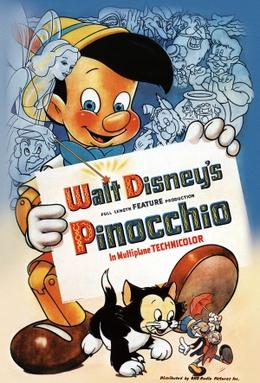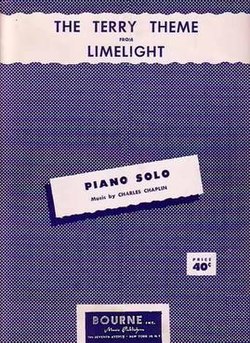
Irving Berlin was an American composer and lyricist. His music forms a large part of the Great American Songbook. Berlin received numerous honors including an Academy Award, a Grammy Award, and a Tony Award. He also received the Presidential Medal of Freedom from President Gerald R. Ford in 1977. Broadcast journalist Walter Cronkite stated he "helped write the story of this country, capturing the best of who we are and the dreams that shape our lives".

Snow White and the Seven Dwarfs is a 1937 American animated musical fantasy film produced by Walt Disney Productions and released by RKO Radio Pictures. Based on the 1812 German fairy tale by the Brothers Grimm, it is the first animated feature film produced in the United States and the first cel animated feature film. The production was supervised by David Hand, and the film's sequences were directed by Perce Pearce, William Cottrell, Larry Morey, Wilfred Jackson, and Ben Sharpsteen.

Pinocchio is a 1940 American animated musical fantasy film produced by Walt Disney Productions and released by RKO Radio Pictures. Based on Carlo Collodi's 1883 Italian children's novel The Adventures of Pinocchio, it is the studio's second animated feature film, as well as the third animated film overall produced by an American film studio, after Disney's Snow White and the Seven Dwarfs (1937) and Fleischer Studios' Gulliver's Travels (1939). With the voices of Cliff Edwards, Dickie Jones, Christian Rub, Walter Catlett, Charles Judels, Evelyn Venable, and Frankie Darro, the film follows a wooden puppet, Pinocchio, who is created by an old woodcarver, Geppetto, and brought to life by a blue fairy. Wishing to become a real boy, Pinocchio must prove himself to be "brave, truthful, and unselfish." Along his journey, Pinocchio encounters several characters representing the temptations and consequences of wrongdoing, as a cricket named Jiminy, who takes the role of Pinocchio's conscience, attempts to guide him in matters of right and wrong.

Cinderella is a 1950 American animated musical fantasy film produced by Walt Disney Productions and released by RKO Radio Pictures. Based on Charles Perrault's 1697 fairy tale, the production was supervised by Ben Sharpsteen, and was directed by Wilfred Jackson, Hamilton Luske, and Clyde Geronimi. The film features the voices of Ilene Woods, Eleanor Audley, Verna Felton, Rhoda Williams, James MacDonald, and Luis van Rooten.
Disney Music Group (DMG) is the music recording and publishing arm of Walt Disney Studios, a division of Disney Entertainment, which is owned by The Walt Disney Company. It is located at the studio's headquarters in Burbank, California. The division's subsidiaries consist of two owned record labels—Walt Disney Records and Hollywood Records—along with Disney Music Publishing, the publishing entity that administers the company's music, as well as Disney Concerts. Disney Music's Vevo account on YouTube is currently one of the most-viewed YouTube channels as of June 2023.
"When You Wish Upon a Star" is a song written by Leigh Harline and Ned Washington for the 1940 Disney animated film Pinocchio, based on the children's fairy tale novel The Adventures of Pinocchio by Italian author Carlo Collodi. The original version was sung by Cliff Edwards in the character of Jiminy Cricket, and is heard over the opening credits and in the final scene of the film. The recording by Cliff Edwards and Chorus was released by Victor Records as catalogue number 261546 and 26477A and by EMI on the His Master's Voice Label as catalogue number BD 821.
Fantasy in the Sky was the first fireworks performance at Disneyland in Anaheim, California, beginning in 1958 and running until 1996. The show also appeared at the Magic Kingdom in Lake Buena Vista, Florida from 1971 until 2003, at Tokyo Disneyland in Urayasu, Chiba, Japan from 1983 until 1988 and at Disneyland Paris from 1993 to 2005 in Marne-la-Vallee, France.

Disney Sing-Along Songs is a series of videos on VHS, betamax, laserdisc, and DVD with musical moments from various Disney films, TV shows, and attractions. Lyrics for the songs are sometimes displayed on-screen with the Mickey Mouse icon as a "bouncing ball". Early releases open with a theme song introduction containing footage featuring Professor Owl and his class, seen originally in 1953 in two Disney shorts, Melody and Toot, Whistle, Plunk, and Boom. Professor Owl hosts some of the videos, while either Jiminy Cricket or Ludwig Von Drake host others. Later volumes, as well as the two Christmas videos, do not feature a host at all. Scenes with Jiminy Cricket and Ludwig Von Drake were taken from television programs, including the Walt Disney anthology television series and The Mickey Mouse Club, which featured the characters in the 1950s and 1960s.
Leigh Adrian Harline was an American film composer and songwriter. He was known for his "musical sophistication that was uniquely 'Harline-esque' by weaving rich tapestries of mood-setting underscores and penning memorable melodies for animated shorts and features."

"Heigh-Ho" is a song from Walt Disney's 1937 animated film Snow White and the Seven Dwarfs, written by Frank Churchill (music) and Larry Morey (lyrics). It is sung by the group of Seven Dwarfs as they work at a mine with diamonds and rubies, and is one of the best-known songs in the film. It is also the first appearance of the seven dwarfs. The other Dwarf Chorus songs are "Bluddle-Uddle-Um-Dum" and "The Silly Song".

On the Record is a jukebox musical revue featuring many classic songs from a variety of live action and animated films and television series produced by Walt Disney Pictures, Broadway musical plays produced by Walt Disney Theatrical, and even Disneyland attractions. This theatrical celebration of 75 years of Disney music tells the story of four singers recording a greatest hits album in a magical recording studio. After opening in Cleveland in 2004, the production toured for nine months, visiting 24 cities in the United States before closing in Denver in mid-2005.
"Someday My Prince Will Come" is a song from Walt Disney's 1937 animated movie Snow White and the Seven Dwarfs. It was written by Larry Morey (lyrics) & Frank Churchill (music), and performed by Adriana Caselotti. It was also featured in the 1979 stage adaptation of the 1937 animated musical movie. In AFI's 100 Years...100 Songs, it was ranked the 19th greatest film song of all time.

7 Wise Dwarfs is a 1941 four-minute educational short animated film made by the Walt Disney Studios for Walt Disney Productions, for the National Film Board of Canada. The film was released theatrically on December 12, 1941, as part of a series of four films directed at the Canadian public to learn about war bonds during the Second World War. 7 Wise Dwarfs was directed by Richard Lyford and featured the voice talent of Pinto Colvig as "Doc".

As Thousands Cheer is a revue with a book by Moss Hart and music and lyrics by Irving Berlin, first performed in 1933. The revue contained satirical sketches and witty or poignant musical numbers, several of which became standards, including "Heat Wave", "Easter Parade" and "Harlem on my Mind". The sketches were loosely based on the news and the lives and affairs of the rich and famous, as well as other prominent personalities of the day, such as Joan Crawford, John D. Rockefeller Jr., Noël Coward, Josephine Baker, and Aimee Semple McPherson.

"My Mammy" is an American popular song with music by Walter Donaldson and lyrics by Joe Young and Sam M. Lewis.
Edward Holcomb Plumb was a film composer and orchestrator best known for his work at Walt Disney Studios. He served as musical director of Fantasia and orchestrated and co-composed the score for Bambi, and orchestrated and expanded the film's main composer Frank Churchill's menacing but simple three-note theme.
Snow White and the Seven Dwarfs is a musical theatre with music and lyrics by Frank Churchill and Larry Morey, and additional music and lyrics by Jay Blackton and Joe Cook, and book by Cook. Adapted from Walt Disney Productions' 1937 animated musical film of the same name – which in turn had been based on the classic 1812 German fairy tale by the Brothers Grimm – about a princess banished from her kingdom by her vain stepmother, and she comes to live with seven dwarfs in their woodland home.
"I Love a Piano" is a popular song with words and music by Irving Berlin. It was copyrighted on December 9, 1920 and introduced in the Broadway musical revue Stop! Look! Listen! when it was performed by Harry Fox and the ensemble. The song was given a tremendous boost in the show as the set for it consisted of an enormous keyboard running completely across the stage. In front of this were six pianos with six pianists playing the tune. Irving Berlin always regarded the song as one of his best efforts.
Snow White is a Disney media franchise that began in 1937 with the theatrical release of Snow White and the Seven Dwarfs. It is based on the 1812 fairy tale by the Brothers Grimm.

R. John Wright Dolls is an art doll making workshop located in Bennington, Vermont. Established in 1976, R. John Wright Dolls (RJW) is a privately held company founded by R. John Wright.











